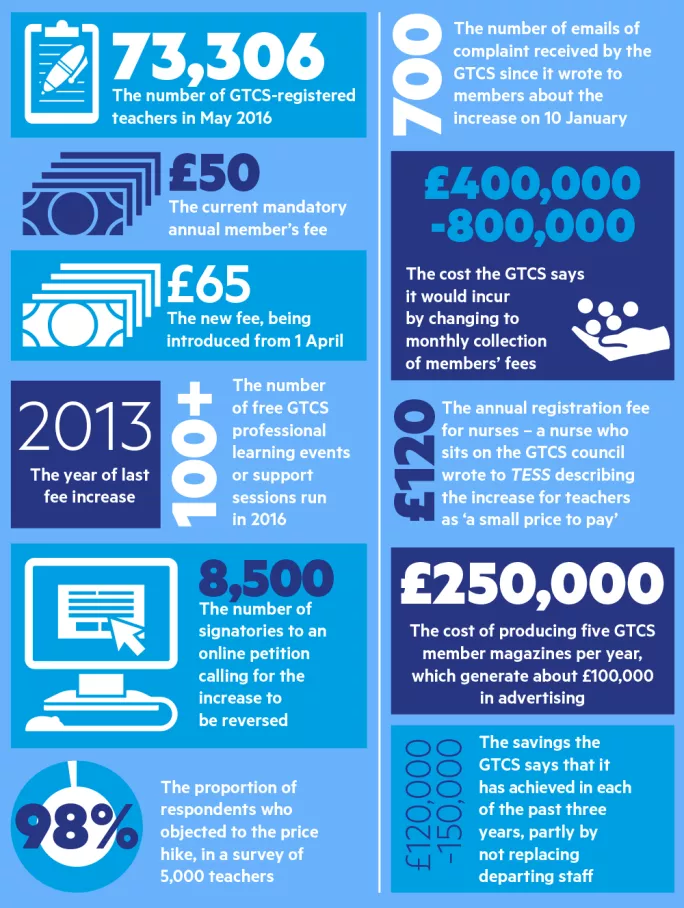Teachers vent their fury over GTCS fee increase

Raising the General Teaching Council for Scotland’s mandatory registration fee by 30 per cent was “the right thing to do”, its chief executive has insisted - despite a furious backlash from members.
In an exclusive interview with TESS, Ken Muir said that the move, generating about £1 million, had been made with “a heavy heart” but was unavoidable.
He defended the organisation’s widely criticised Professional Update system and members’ magazine, and condemned what he called the “vitriol and bile” directed at GTCS staff in the wake of the decision.
A survey about the price hike, which was launched by primary teacher Athole McLauchlan, attracted 5,000 responses within hours.
It could have received many more responses had the system used not set a limit of 5,000, according to Mr McLauchlan. He said teacher discontent had a reached a “tipping point” with the decision to raise the annual fee from £50 to £65 (see “It’s a protest about the constant pressure to up our game” box, below).
‘We need to do more to remind members what they get or their money’
Separately, a petition that calls for the increase to be scrapped had attracted nearly 9,000 signatures by the time TESS went to print.
But Mr Muir said: “There was no way to avoid an increase…of this scale”.
The move had been unanimously agreed by both the GTCS’ finance and general purposes committee and its council, including many teachers and trade union members.
They made the decision with a “heavy heart”, according to Mr Muir. But, when asked if the same decision would be made again in light of the extraordinary reaction, he said: “I absolutely think that is the case.”
He claimed that the fee was “good value for money”, compared with other professions’ registration schemes.
Fees had not risen since 2013, said Mr Muir, because the GTCS council had taken a “planned, strategic decision” four years ago “to effectively run a deficit budget” after being advised by the Office of the Scottish Charity Regulator that its financial reserves were too high.

‘Unacceptable abuse’
Mr Muir added that he was “very disappointed” in the “unprofessional language” that he claimed a minority of complainants who had responded to the GTCS via email had used. He argued that some of it quite “frankly crosses the line of the Code of Professionalism and Conduct”, or even constituted hate speech.
Martin Osler, the GTCS’ director of communications, digital development and HR, told TESS that in nearly 10 per cent of these emails about the price hike, staff had been subjected to “abuse” and “aggressive behaviour”, and had been called “incompetent”, “bureaucratic morons” or “teaching Gestapo”.
Mr Muir partly attributed the negative reaction to a lack of knowledge about the GTCS. “We’re accepting that we need to do more to remind [members] about what it is they get for their money,” he said. The fee increase will allow the GTCS to continue “to deliver what I think we’ve delivered really well”, he added.
This included running “critical parts of the Scottish education infrastructure”, although two of the most high-profile - the Student Placement System and the Teacher Induction Scheme - are operated but not funded by the GTCS.
One regular complaint has been about the value of a members’ magazine sent out five times a year, costing £150,000 after taking into account advertising revenue.
But Mr Osler responded: “The corollary to that is, well, if you read the magazine, then you would know a lot more about what the GTCS does.”
There were many complaints that the Professional Update system, which is being phased in and will eventually require all teachers to provide evidence of regularly adding to their expertise, was not user-friendly, and that learning could not be shared.
The GTCS said that its separate pilot, the MyProfessionalLearning (MyPL) online service - also not funded by member fees - will make it easier to share work with colleagues, in a similar way to commercial sites such as Twitter and Yammer
Mr Muir said the GTCS’ role was primarily to give a “guarantee to the public” that teaching standards “remain high”.
He cited “the mess that the education system is in south of the border” since England’s GTC was abolished in 2012, which he said had led to an educational “free-for-all” with adverts for unqualified teachers appearing “pretty much on a daily basis”.
You need a Tes subscription to read this article
Subscribe now to read this article and get other subscriber-only content:
- Unlimited access to all Tes magazine content
- Exclusive subscriber-only stories
- Award-winning email newsletters
Already a subscriber? Log in
You need a subscription to read this article
Subscribe now to read this article and get other subscriber-only content, including:
- Unlimited access to all Tes magazine content
- Exclusive subscriber-only stories
- Award-winning email newsletters